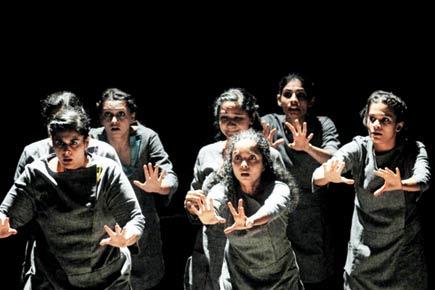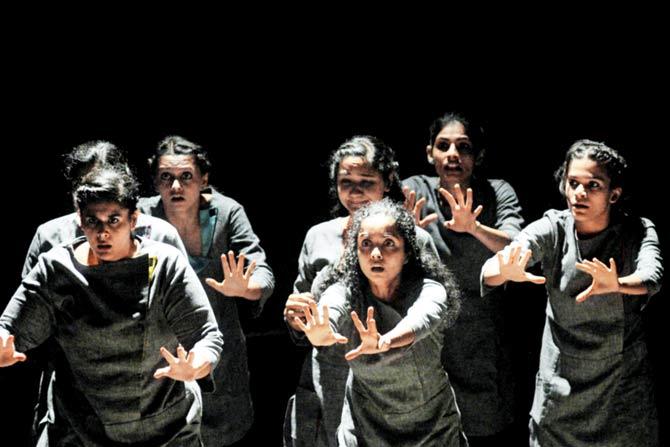Theatre has the power to bring home global issues and debates, and give local audiences a jolt of reality every now and then

 If an Indian filmmaker — even one making an indie festival project — were to make a film on the problems of women in Iran, the film would probably not get a release in India. The power of theatre is such that, it can bring global issues to an audience and make them care.
If an Indian filmmaker — even one making an indie festival project — were to make a film on the problems of women in Iran, the film would probably not get a release in India. The power of theatre is such that, it can bring global issues to an audience and make them care.
ADVERTISEMENT
Primetime Theatre’s 9 Parts of Desire was about political and gender issues in Iraq, earlier Akvarious’s Baghdad Wedding was also about the trauma suffered by the people of war-torn Iraq. QTP’s So Many Socks was about Tibetans and their struggle for their homeland; his Peasants of El Salvador about the travails of a poor farmer during the brutal civil war in the Latin American country. Aasakta’s Main Hoon Yusuf Aur Yeh Hai Mera Bhai was about the still festering issue of the Palestinian people fighting for their land.

Faezeh Jalali’s 7/7/07 is about an Iranian teenager who was hanged for the murder of a man who tried to rape her. The production has been devised by ten actors and played out on a bare stage using light and shadows for maximum impact
All these stories may be taking place in distant lands, but they are a part of a larger mosaic of human rights that should concern everybody who cares about the way the world is headed.
One of the most powerful pieces of theatre in recent months is Faezeh Jalali’s 7/7/07 and it’s about an Iranian teenager who was hanged for the murder of a man who tried to rape her. Reyhaneh Jabbari was just nineteen when she was arrested and after six years of torment in prison, she was hanged in October 2014, despite worldwide protests and appeals for mercy.
Jalali’s production has been devised by ten actors — seven female, three male — and played out on a bare stage using light and shadows for maximum impact (lighting design Arghya Lahiri). The actors’ voices and stylised movements are enough to convey the tragedy of Reyhaneh’s brief life. Her ‘fault’? Youthful enthusiasm, naïve trust and later, the courage of her conviction.
In spite of the post-Nirbhaya outpouring of support for rape victims (or survivors, as the currently preferred term is), a woman who is molested is invariably seen to be at fault — and this is common all over the world. Why she out alone at night? Why was she provocatively dressed? Why was she drinking? Why did she go meet a man without a chaperone? She must be a slut with loose morals! She asked for it.
Reyhaneh is alternatively played by all the young women in the cast because she could be any teenager in any part of the world, and she would probably suffer the same humiliation. It was easy to pillory Reyhaneh in court — an enthusiastic design student, she gave her number to an older man, Dr Sarbandi, who asked her to design his clinic. She made the mistake of getting into a car alone with two strangers, the mistake of accompanying Dr Sarbandi to an apartment, fighting off his sexual assault by stabbing him, then running out of the place and calling an ambulance. She made the mistake of taking the knife with her and not telling her parents what happened. She was a young girl, she was confused and terrified, but the police twisted her innocence into something sordid and sinister. It was her misfortune that the dead man was a former intelligence official.
Even though Dr Sarbandi was found with multiple stab wounds and Reyhaneh insisted that she had stabbed him just once, she was disbelieved. The cops who could not find the real killer, beat the young girl and threw her into solitary confinement for long periods of time to break her spirit. Her defence lawyer’s arguments were ignored, but the prosecutor’s absurd allegations about her being a spy were taken seriously. The judge believed that a man from a religious family could not possibly have attempted to rape Reyhaneh, just like so many Indian politicians who make ludicrous statements defending rapists.
For a girl from a sheltered background, Reyhaneh’s courage was astounding. She refused to be bullied into altering her statement even when she was offered a pardon by Dr Sarbandi’s son if she withdrew the allegation against his father.
Other women in prison with Reyhaneh are also victims of a patriarchal system, unjust and inhumane towards women. They support each other and find little moments of joy within the bleakness of the prison, especially with the threat of more pain or death hanging over them. That they still have the ability to sing and laugh is a miracle in itself.
Reyhaneh died without breaking or bending and in an amazing act of clear-headedness and generosity, wrote to her mother to donate her “heart, kidney, eye, bones and anything that can be transplanted be taken away from my body and given to someone who needs them as a gift.”
There must be thousand of Reyhanehs in India and all over the world. And their stories have to be told. Faezeh Jalali chose to tell Reyhaneh’s story and jolted the audience. Maybe somebody else will be inspired to bring other stories to the stage, wring more hearts and minds with a dose of reality. There is too much escapism going around.
Deepa Gahlot is an award-winning film and theatre critic and an arts administrator. She tweets at @deepagahlot
 Subscribe today by clicking the link and stay updated with the latest news!" Click here!
Subscribe today by clicking the link and stay updated with the latest news!" Click here!






